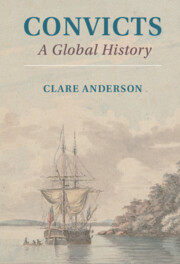Book contents
- Convicts
- Convicts
- Copyright page
- Dedication
- Contents
- Figures
- Maps
- Tables
- Acknowledgements
- 1 Introduction
- Part I
- Part II
- 7 Punishment and Penal Systems
- 8 Encounters, Exploration, and Knowledge
- 9 Medicine, Criminality, and Race
- 10 The Human Sciences
- 11 Escape and Extradition
- 12 Conclusion
- Appendix Principal and Selected Imperial and Latin American Sites of Punitive Relocation
- Bibliography
- Archives
- Index
10 - The Human Sciences
from Part II
Published online by Cambridge University Press: 06 January 2022
- Convicts
- Convicts
- Copyright page
- Dedication
- Contents
- Figures
- Maps
- Tables
- Acknowledgements
- 1 Introduction
- Part I
- Part II
- 7 Punishment and Penal Systems
- 8 Encounters, Exploration, and Knowledge
- 9 Medicine, Criminality, and Race
- 10 The Human Sciences
- 11 Escape and Extradition
- 12 Conclusion
- Appendix Principal and Selected Imperial and Latin American Sites of Punitive Relocation
- Bibliography
- Archives
- Index
Summary
This chapter suggests that the cosmopolitanism of convicts, ex-convict settlers, and their descendants rendered penal colonies ideal places for investigations into the human sciences, and for the development of social science research methods. Administrators and visitors carried out innovative statistical and ethnographic studies in punitive locations, triangulating medical records, and anthropometric measurement with surveys, questionnaires, and interviews. The focus of attention of such research included the pathology of criminal behaviour, the social, cultural, and biological impacts of transportation, and sexuality. In some cases, it emerged out of a concern with the merits or otherwise of penal colonization. In others, it contributed to and shaped contemporary debates on race and, in the Indian context, caste. This can be seen in the analysis of the work of French naval surgeon Joseph Orgéas, in French Guiana; Anton Chekhov’s famous study of Sakhalin Island in the Russian Far East; and censuses in the Andaman Islands. Finally, the chapter examines Franck Cazanove’s study of sexuality in the relégué(e) (repeat offender) settlement of Saint-Jean-du-Maroni in French Guiana. Inadvertently, though focused on ‘depravity’, it reveals much about same-sex cohabitation, marriage, and love.
Keywords
- Type
- Chapter
- Information
- ConvictsA Global History, pp. 319 - 359Publisher: Cambridge University PressPrint publication year: 2022

